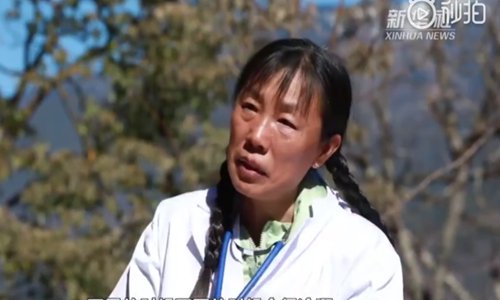
Guan Yanping. (Photo: Screenshot of Xinhua Insight video)
"Doctors from Guangdong Province are here providing medical treatment and examinations, please come to the villagers' activity room." Guan Yanping had just reached the top of a mountain as the announcement from a loudspeaker echoed through Bingzhongluo county of the Nujiang Lisu Autonomous Prefecture in Southwest China's Yunnan Province.
Guan took out her stethoscope from her pack basket while trying to get her breath back from the difficult trip, and a nurse was setting up an electrocardiography machine. It is a scene that has taken place frequently in many villages of Bingzhongluo county.
Guan first arrived at Bingzhongluo in March 2017 as the first batch of doctors from Zhuhai, South China's Guangdong Province, to work in the impoverished Nujiang Lisu autonomous prefecture.
In the past year, Guan has crossed mountains and rivers to make more than 200 medical visits to 46 villages with her pack basket.
Tough journey
Guan, 50, worked in the department of gynecology and obstetrics at a hospital of Sanzao county, Zhuhai, South China's Guangdong Province, as a deputy chief physician before she came to Nujiang.
With 26 years' work experience in various departments including surgery, gynecology and obstetrics, Guan had been assigned to establish the Haicheng health center at Sanzao county as a general medical practitioner in 2015.
In March 2017, the health authority of Jinwan district announced that it would dispatch several doctors to Nujiang to help establish a public health and family physician system there. As a general medical practitioner with rich experience in the public health sector, Guan had no hesitation signing up.
After the decision, she started to worry about her 80-year-old mother and two elder brothers, who had diabetes and hypertension. In order to guarantee their health, Guan taught her son and nephew how to measure blood glucose and pressure. After arriving in Nujiang, she asked her son to check on her mother and brothers' condition every day.
It took Guan three days to get to Bingzhongluo after a bumpy bus trip.
"Before the first medical visit to the mountain, I was hoping to bring an electrocardiography machine," Guan told thepeople.cn. "Then I was told the medical equipment here was in boxes and gathering dust in the warehouse, since no one knew how to use them," said Guan. She was astonished by the situation. In the days that followed, Guan trained her colleagues how to operate an electrocardiography machine and ultrasonic machine.
Her pants were covered in thistles and thorns, which she had to remove one by one, as they hurt her legs and ankles. Sometimes, it was hard for her to climb up the mountain steps, and had no choice but march forward with the help of her partners.
To their surprise, when they got to the village, no one wanted to see them. Village officials had to broadcast the arrival of doctors from Guangdong through loudspeakers.
Because it was difficult to carry the equipment up the mountains, she bought a pack basket to bring the equipment into the villages.
Into the light
Xiaochala village is located deep in the mountains at an altitude of 3,000 meters. Most of the villagers are from the Dulong ethnic group. Before heading to the village, a colleague told Guan never to ask the villagers to give blood for tests, as it was something that the villagers would simply refuse to do, regardless of age and gender.
However, doctors cannot get accurate information on a person's health condition without a blood test. When they arrived at Xiaochala, villagers refused to do blood tests when Guan asked them to. Guan asked a colleague to explain repeatedly in local dialect that it was necessary, until one 70-year-old woman rolled up her sleeves. Other villagers then followed suit.
Guan later learned that the old lady's son was suffering from schizophrenia. After examining the other villagers, Guan went to the old woman's home.
It was a dark wooden house with a bed against the wall and a fireplace in the center of the floor. The schizophrenic son, Luo Xuejun, had been kept in this dark room for more than two years.
When Guan tried to communicate with him, he avoided her out of fear. Guan attempted to approach him, touch his hand and examine him, but was unable to even get close.
Guan tried for half an hour to communicate with Luo, without any success. Before leaving, Guan prescribed some medicine for him and told the old woman how to administer it to him.
When Guan made her third visit to Luo's home, he smiled at her. Guan helped him walk out of the room and into the warm sunshine, and taught him to say "Hello." They then took a group photo on a grassland. Guan said she felt very happy at that moment.
Longer stay
Because the conditions there are so difficult, medical personnel dispatched to Nujiang are rotated out every six months. Guan was supposed to return to Zhuhai in September, 2017. However, a meeting in June 2017 about the high maternal and newborn mortality rate in the region prompted Guan to stick around.
"What shocked me is that the number is triple that in the Pearl River Delta, so I decided to stay for three years to work without the local medical care staff," said Guan.
The following year, in addition to round-the-clock medicine treatment for local residents, Guan also carried out free physical examinations for them. Guan also set up health records for 5,143 residents in the county, and helped the impoverished people there sign family physician contracts.


